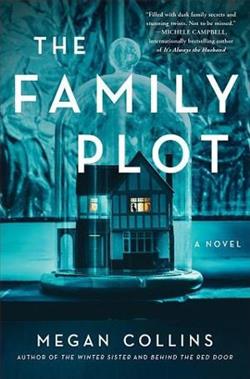'The Family Plot' by Megan Collins is a gripping psychological thriller that delves deep into the complexities of family dynamics, trauma, and the haunting legacy of unresolved grief. Set against the backdrop of a secluded island mansion, the novel intricately weaves a tale of mystery and emotional turmoil, exploring how the past can shape and distort the present.
The protagonist, Dahlia Lighthouse, is a compelling character whose life has been irrevocably altered by the tragic disappearance of her twin brother, Andy. At just sixteen, the siblings shared a bond that was both profound and unsettling, nurtured in an environment dominated by their parents' obsession with true crime. This unique upbringing creates a rich tapestry of psychological depth, as Dahlia returns to the family home years later, grappling with her own demons while confronting the chilling reality of her brother's fate.
Collins masterfully constructs the atmosphere of the Lighthouse mansion, making it almost a character in its own right. The isolation of the setting amplifies the sense of entrapment that Dahlia feels, both physically and emotionally. The mansion, filled with memories and secrets, serves as a haunting reminder of the family's troubled past. As Dahlia navigates the eerie halls, the reader is drawn into a world where every corner holds a whisper of the tragedy that unfolded there.
The discovery of Andy's body, buried in their father's plot, serves as the catalyst for the unraveling of the family's facade. Each family member reacts in their own peculiar way, revealing the fractures in their relationships and the different coping mechanisms they employ. Charlie, the brother who channels his grief into creating a memorial museum, embodies the struggle to memorialize the past while simultaneously being consumed by it. His obsession with murder victims reflects a desperate attempt to make sense of his own family's tragedy.
Tate, the sister who creates dioramas of crime scenes, represents another facet of the family's dysfunction. Her art becomes a means of processing trauma, yet it also highlights the disturbing normalization of violence within their lives. The contrast between her artistic expression and the grim reality of their history is both poignant and unsettling, prompting readers to question the boundaries between art and life.
Their mother, who once engaged in murder reenactments with her children, is perhaps the most tragic figure in this narrative. Her transformation into a cheerfully domestic figure is a stark juxtaposition to the darkness that looms over the family. This duality speaks volumes about the ways in which individuals cope with trauma, often masking their pain with a veneer of normalcy. Collins does an exceptional job of portraying the complexities of grief and the various ways it can manifest within a family unit.
As Dahlia grapples with her own grief and horror, the narrative delves into themes of identity and the search for truth. The question of who is responsible for Andy's death looms large, and as Dahlia investigates, she begins to uncover not only the secrets of her family's past but also the truths about herself. This journey of self-discovery is fraught with tension, as the lines between memory and reality blur, forcing Dahlia to confront the possibility that her understanding of her family may be fundamentally flawed.
Collins' writing is both lyrical and haunting, with vivid imagery that brings the island and its mysteries to life. The pacing is expertly crafted, maintaining a sense of urgency that propels the reader forward while allowing for moments of introspection. The dialogue is sharp and authentic, capturing the nuances of familial relationships and the unspoken tensions that often lie beneath the surface.
In terms of thematic resonance, 'The Family Plot' draws comparisons to works like 'The Family Upstairs' by Lisa Jewell and 'The Silent Patient' by Alex Michaelides, both of which explore the dark undercurrents of family secrets and the psychological impact of trauma. However, Collins' novel stands out for its unique setting and the intricate exploration of how a family's obsession with violence can shape their identity and relationships. The blend of psychological depth with a gripping mystery creates a narrative that is both thought-provoking and thrilling.
Ultimately, 'The Family Plot' is a powerful exploration of the ways in which the past can haunt the present. It challenges readers to consider the complexities of grief, the nature of familial bonds, and the lengths to which individuals will go to uncover the truth. Collins has crafted a story that lingers long after the final page is turned, leaving readers to ponder the shadows that exist within their own families.
In conclusion, Megan Collins has delivered a remarkable debut that is sure to resonate with fans of psychological thrillers. With its rich character development, atmospheric setting, and profound themes, 'The Family Plot' is a must-read for anyone who enjoys a gripping tale that delves into the darker aspects of human nature.
























Reviews 0
Post a Reviews: